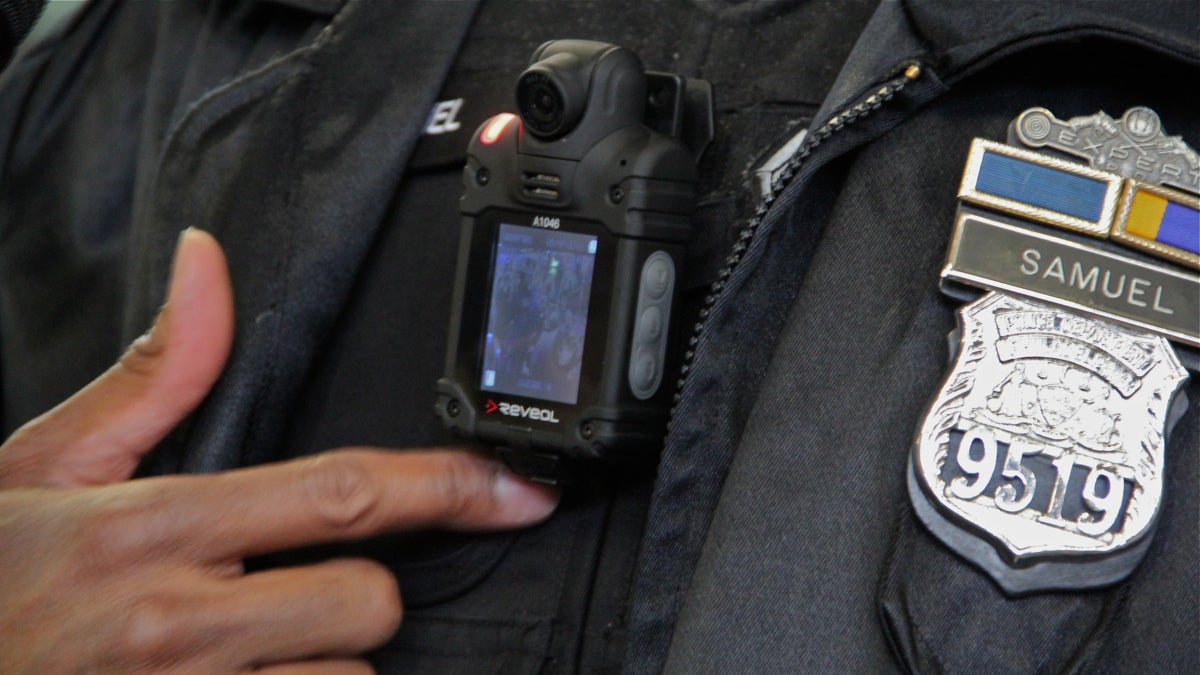Pa. privacy protections may restrict police use of body-worn cameras
Listen
Officer James Samuel turns on a body camera with a small video display. (Emma Lee/WHYY)
As the Philadelphia Police Department experiments with body-worn cameras, concerns about privacy and clashing with state law are gaining traction.
Pennsylvania is among the minority of states that have “two-party consent” laws for recording a conversation or interaction. In other words, it’s technically a crime to record someone without that person’s permission.
A U.S. Justice Department document from last year outlining best practices for body-worn cameras notes that states with two-party consent laws “can create challenges to implementing a body-worn camera program.”
On Tuesday, Police Commissioner Charles Ramsey held a news conference about the findings of a national task force he co-chaired that examined proposals to build faith between the public and law enforcement. Among an array of other recommendations, the group called for wider adoption of body-worn cameras, or BWCs.
“By documenting encounters between police and the public, BWCs can also be used to investigate and resolve complaints about officer-involved incidents,” according to the task force’s report.
But Ramsey said making sure the practice doesn’t run afoul of state law is on the top of his mind.
“We have to tell people,” Ramsey said after the news conference. “We still have to make them aware that they’re being recorded. And if they say they don’t want to be, then we would have to turn that camera off. But we would at least have on camera the fact that they don’t want to be recorded.”
In a recent interview with the Sentinel, Carlisle Police Chief Steve Margeson said the permission rule makes implementing the body cameras, at times, clumsy.
“The tricky part then comes into the protocols and the policies on use and that tricky part is much more awkward for us in Pennsylvania because of our state law,” he said. “Until we get to a point where we are comfortable, we can’t be going out there and using this equipment in a fashion that some people may say is illegal by our own state statute. So that’s one of the reasons we’re taking this nice and slow. We’re waiting to see, might there be some changes to this law?”
The state’s current legal landscape aside, the task force’s report found that body-worn cameras can yield meaningful results. Officers who were wearing cameras had 87 percent fewer incidents of use of force and nearly 60 percent fewer complaints, compared with officers who were not wearing them.
“When police officers are acutely aware that their behavior is being monitored (because they turn on the cameras), and when officers tell citizens that the cameras are recording their behavior, everyone behaves better,” according to the report.
At the same time, balancing privacy rights with police transparency, the task force noted, will continue to be a challenging undertaking.
“When the public does not believe its privacy is being protected by law enforcement, a breakdown in community trust can occur.”
WHYY is your source for fact-based, in-depth journalism and information. As a nonprofit organization, we rely on financial support from readers like you. Please give today.




